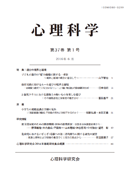Volume 9, Issue 2
Displaying 1-18 of 18 articles from this issue
- |<
- <
- 1
- >
- >|
-
Article type: Cover
1986 Volume 9 Issue 2 Pages Cover1-
Published: March 30, 1986
Released on J-STAGE: September 10, 2017
Download PDF (30K) -
Article type: Cover
1986 Volume 9 Issue 2 Pages Cover2-
Published: March 30, 1986
Released on J-STAGE: September 10, 2017
Download PDF (30K) -
Article type: Appendix
1986 Volume 9 Issue 2 Pages App1-
Published: March 30, 1986
Released on J-STAGE: September 10, 2017
Download PDF (47K) -
Article type: Article
1986 Volume 9 Issue 2 Pages 1-15
Published: March 30, 1986
Released on J-STAGE: September 10, 2017
Download PDF (2071K) -
Article type: Article
1986 Volume 9 Issue 2 Pages 16-33
Published: March 30, 1986
Released on J-STAGE: September 10, 2017
Download PDF (2093K) -
Article type: Article
1986 Volume 9 Issue 2 Pages 34-52
Published: March 30, 1986
Released on J-STAGE: September 10, 2017
Download PDF (2035K) -
Article type: Article
1986 Volume 9 Issue 2 Pages 53-62
Published: March 30, 1986
Released on J-STAGE: September 10, 2017
Download PDF (1207K) -
Article type: Article
1986 Volume 9 Issue 2 Pages 63-64
Published: March 30, 1986
Released on J-STAGE: September 10, 2017
Download PDF (226K) -
Article type: Article
1986 Volume 9 Issue 2 Pages 65-66
Published: March 30, 1986
Released on J-STAGE: September 10, 2017
Download PDF (321K) -
Article type: Article
1986 Volume 9 Issue 2 Pages 66-67
Published: March 30, 1986
Released on J-STAGE: September 10, 2017
Download PDF (317K) -
Article type: Article
1986 Volume 9 Issue 2 Pages 68-70
Published: March 30, 1986
Released on J-STAGE: September 10, 2017
Download PDF (393K) -
Article type: Article
1986 Volume 9 Issue 2 Pages 71-
Published: March 30, 1986
Released on J-STAGE: September 10, 2017
Download PDF (197K) -
Article type: Article
1986 Volume 9 Issue 2 Pages 72-73
Published: March 30, 1986
Released on J-STAGE: September 10, 2017
Download PDF (324K) -
Article type: Article
1986 Volume 9 Issue 2 Pages 73-74
Published: March 30, 1986
Released on J-STAGE: September 10, 2017
Download PDF (318K) -
Article type: Article
1986 Volume 9 Issue 2 Pages 75-76
Published: March 30, 1986
Released on J-STAGE: September 10, 2017
Download PDF (266K) -
Article type: Appendix
1986 Volume 9 Issue 2 Pages App2-
Published: March 30, 1986
Released on J-STAGE: September 10, 2017
Download PDF (22K) -
Article type: Cover
1986 Volume 9 Issue 2 Pages Cover3-
Published: March 30, 1986
Released on J-STAGE: September 10, 2017
Download PDF (31K) -
Article type: Cover
1986 Volume 9 Issue 2 Pages Cover4-
Published: March 30, 1986
Released on J-STAGE: September 10, 2017
Download PDF (31K)
- |<
- <
- 1
- >
- >|
